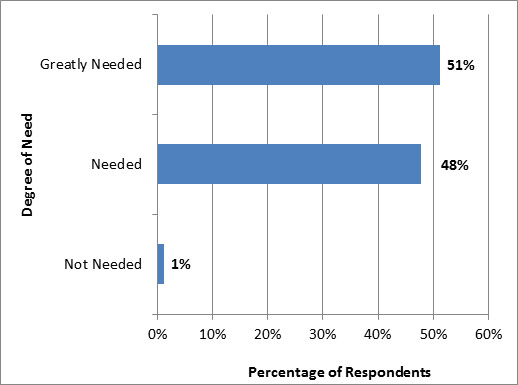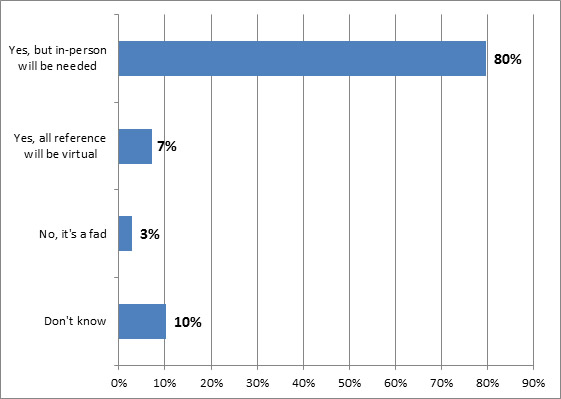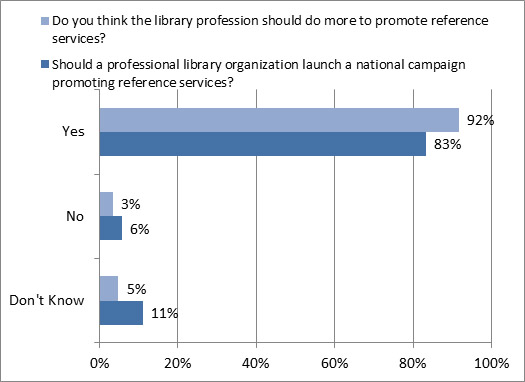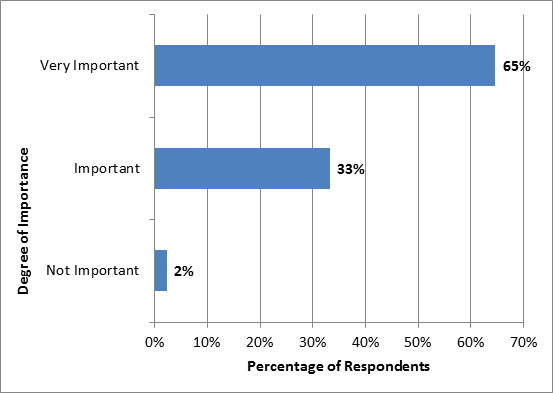In a world where unreliable authorship and reviewed scholarship are in a mixed bag just a Google search away, what role should the library community play in providing information acquisition and discernment?
Inspired by a discussion from the Dig_Ref listserv, LRS conducted a 60-Second Survey in late 2008 and asked if librarian-assisted reference services should be promoted. If so, should a library organization promote reference, perhaps with an “ASK” campaign (similar to ALA’s “READ” campaign)? The survey also included questions to measure opinion on the significance of reference and virtual reference. Almost 1,500 library employees responded and more than 560 of them shared their views and ideas with comments.
What is an LRS 60-Second Survey?
In the style of an online readers’ poll, the 60-Second Survey format is short and to the point. By definition, the survey can be answered in a minute or less. Narrow by intent, 60-Second Surveys capture the perceptions and knowledge of respondents on a single timely topic. The online surveys are distributed electronically via email, listservs, blogs, etc. Results are reported briefly on the LRS blog and in more detail in Fast Facts.
Promoting Reference
Respondents overwhelmingly agreed (92%) that the library profession should do more to promote reference services (see Chart 1). A handful of respondents (3%) said that reference services should not be promoted at all. The remaining 5 percent responded that they are not sure whether reference services should be promoted.
Chart 1:
The Promotion of Reference Services
The idea of a professional organization launching a national campaign to promote reference garnered slightly less but still substantial support, with more than 8 out of 10 (83%) respondents in favor (see Chart 1) of such an effort. Just over 20 (6%) said that a professional organization should not launch a reference campaign and the remainder (11%) said they “don’t know.”
Public library employees were most likely to be in favor of the idea of a professional organization starting a reference campaign, with 87 percent indicating support. Respondents from academic libraries were somewhat less likely to favor a campaign, with 78 percent in support.
Many comments substantiated the respondents’ support of a national campaign for reference. The small percentage of dissenting respondents opined that librarians are busy enough with in-person, phone, chat, and email reference; there is no need to promote their services. Others lamented that reference desks are too often staffed by under-trained employees, which they consider a predicament that puts limitations on a service they decree as critical.
“This is a vital effort. Re-branding reference librarians as ‘super searchers’ ought to be job #1 for the profession.”
Reference as a Critical Service
As one would anticipate, the survey results show the value placed in reference services with 1,473 (99%) of the 1,494 respondents viewing librarian-assisted searching as a necessity. More than half of those respondents (51%) say that assisted searches are greatly needed (see Chart 2). Only 17 respondents claimed that librarian-assisted reference services are not needed (1%).
Chart 2:
How great is the need for librarian-assisted search services in today’s information environment?
Librarians concur that reference services are needed, but are they considered critical to the survival of libraries? Just under two-thirds (65%) of the respondents agree that reference services are very important to the survival of libraries and one-third (33%) feel they are important (see Chart 3). Only 2 percent of respondents claimed that reference services are not important to the survival of libraries.
Chart 3:
How critical are reference services to the survival of libraries?
Virtual Reference
Respondents believe that virtual reference will be an integral complement to in-person interviews in the future of librarian-assisted searching (see Chart 4). Eight out of 10 (80%) respondents agree that virtual reference will be an important tool going forward, but it will never replace in-person reference interviews. Less than 1 in 10 (7%) responded that all reference would soon be done in a virtual environment, and less than half that many (3%) think virtual reference is a fad.
“It is the in-person service that provides the opportunity for the most efficient, meaningful, and thorough support and instruction . . . while at the same time defining the dynamic and rich social-educational community that is the library. Virtual reference is a distant second to the real thing!”
Chart 4:
Do you think virtual reference services are the future of library reference?

Many comments left by respondents regard virtual reference as an essential service provided by libraries. Other comments suggest that existing virtual reference tools are clunky and do not provide proper patron feedback in the timely manner necessary to complete successful reference transactions. Some comments indicated a hopeful attitude that technology will advance and bring about better tools in the future.
“Sometimes I wish librarians would stop trying to out google Google. Let it go! Focus on how we can teach people to search smarter.”
Surprising Results?
The idea that librarians consider reference to be a valuable service comes as no surprise. The real story lies in the fact that a strong majority of librarians would like to see a professional library organization launch a campaign to promote reference services, which they view as a critical function of libraries. The overwhelming response shows that librarians are interested in sharing their thoughts on how libraries might advance the public’s awareness and utilization of librarian-assisted information acquisition.
“We need to meet our users where they are, not where we wish they were. Many people never set foot into a library anymore, but they could use our assistance in sorting through all of the garbage that is floating around on the Internet to locate the reliable, authoritative information. Without marketing our services, without making the public aware of what we have to offer them, how can they know just how much we can help them?”

